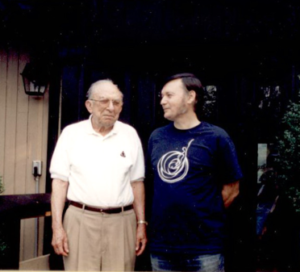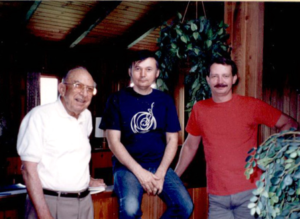
At Nancy Penn Center, TMI. Lifeline, July, 1995

The usual suspects that week, Ed and me and Rich Spees
I have been extraordinarily fortunate in my mentors. This series of posts mentions friends who helped open new worlds to me, but necessarily leaves out others equally important in their own way, merely because no one could mention every important person in his life, any more than he could mention or every thing that was important. A pity, that, but inescapable.
I was able to leave the newspaper primarily because of Living Is Forever, a manuscript by one J. Edwin Carter, sent us in the fall of 1989 by Eleanor Friede, a literary agent who was a friend of Bob Monroe’s and who knew Bob Friedman as well. Ed, we learned later, had retired as CEO of Inco, Ltd. (International Nickel), and had found himself trying to write a novel. He didn’t know why he had to write it, he didn’t particularly want to write it, and he never knew where the plot was going – all of which he describes in the book’s prologue. All he knew is that he had to write it.)
I read the manuscript and saw that it had good scenes, an interesting story, and an important message, but needed rewriting. As much out of the goodness of my heart as for any business reason, I wrote Mr. Carter a three-page letter saying why I thought the manuscript not publishable in its present form, and giving an extensive analysis of the changes that I thought would make it work. I noted this in my journal, adding, “Not that any of this helps deal with my personal life.” Proof again of how little I know.
In December, 1989, Mr. Carter responded to my letter, agreeing with my criticisms, but saying he could not himself do the work needed to fix it. He said that he would be willing to pay a professional editor to do the job, and at Bob Friedman’s suggestion, I offered to do it and also guaranteed publication by Hampton Roads—for I did believe in the value and appeal of the story, and knew I could put it into publishable shape. When Ed agreed, I arranged that he pay the money to the company rather than to me personally, and the company in turn put me on the payroll part-time. This meant that I could begin to leave the newspaper! Before the end of January 1990 I was working half-time at the paper and half-time at Hampton Roads.
Soon Ed and I were conferring over the phone and sending each other disks in the course of the rewrite. And since he had specified in the contract that I should confer with him in person at least once a month, I two or three times flew down to Jekyll Island, Georgia, where he and his wife Meredith were wintering, and spent weekends with them. In short order Mr. and Mrs. Carter had become Ed and Meredith, and he and I had become friends. Between the book project and our developing habit of telephone conferences “just to check in,” he became ad hoc financial advisor, then investor, and finally full partner in our publishing enterprise. In the seven years we knew each other, he and I went down several surprising roads together, Hampton Roads and TMI not least.
As a big “for instance,” I did Lifeline mostly because Ed asked me to do it with him, and made it possible by paying my way. He said he thought he and I would both get more out of the program if we did it together.
If I had not done Lifeline in July 1995, I might have had to wait a long time before another opportunity arose. Literally on the day Lifeline ended, Ed (newly a shareholder in HRPC) and Bob Friedman and I were enmeshed in the details of moving the company from Norfolk to Charlottesville. All fall I worked hard, first at moving the company, then commuting between Charlottesville and the Hampton Roads area (where my family remained until the following spring). In December Ed and I rented an apartment together, which gave me a place to stay weeknights and him a place when he came to spend a week or ten days every so often. An unexpected bonus to this mutually convenient arrangement was that it gave us a convenient place and time to have sessions with The Gentlemen Upstairs.
Meteors pass so quickly. On Wednesday evening, December 4, 1996, Ed called me from his place in New Hampshire, and we had had one of our long phone conversations, in the course of which he made a point of paying me a couple of compliments that had the air of having been long thought and never previously said. In retrospect, the call was a farewell.
I went to bed and awoke at about 4 a.m. , sat down at my computer, and at Ed’s request asked TGU to expand on their prior reply to a question he had had me ask them. This consultation ended at 4:54 a.m. and I sent it off to Ed as an e-mail message, which means he had all day Thursday to read it, though nobody can positively state that he did.
Ed’s daughter Ginna Colburn had come to work for us, staying at her father’s apartment during the week and returning home to West Virginia for long weekends. On that Friday Ginna told me that she had just been told that her father had been found dead near his computer, having died apparently swiftly and presumably painlessly.
Calling the staff into the conference room and telling them was the saddest duty I had ever had there. We all held Ed in great affection. After a while Bob Friedman and I went into one of our offices and turned on the tape recorder and I went Upstairs, to see what The Gentlemen Upstairs had to say about it.
&&&
Here are excerpts from my transcript:
Bob: Do you have any comments about the reason Ed chose this particular time to leave us?
Although what you call his Downstairs level sort of forgot, itself, he’d been telling you for more than two years he was going to leave this month. He later was hedging his bets, but this was the plan. He was surprised to go, actually. We will give you the assurance that he’s not disappointed, however. He has finished— There would never be an empty agenda, because he was always one to put more into the mix, but he finished all the things that were the most urgent, and he more than accomplished what he came here to do. [Pause.] You will find that he didn’t leave you without final messages, some of which were already delivered.
Bob: Do you know where he is now?
He’s where he always was, but—disconnected from this body, let’s put it that way. If you mean, is he aware and conscious at this point—unlike the people who need time to recuperate, you know?—yes he is. Very quickly and easily and we can talk to him if you wish.
Bob: I’m not sure we wish, except to wish him godspeed, and that if he has any messages for us, to tell us, at this point.
We smile, passing on his smile, because he’s saying something that amounts to, “Don’t worry, I’ll have messages for you.” [A laugh.] To-do lists. …
Bob: Anything else you wish to say?
We remind you that Ed Carter went downstairs in a Heartline program after a particular tape and looked around and said everyone in the room was an angel. And we tell you that he saw true. You understand? … You’re all surrounded by angels. Which means, of course, that you’re all angels. Not meaning you’re not human, but meaning that humans are more than you think you are. And we say “you” with an asterisk, because it’s more like “we,” but you make the distinctions.
Bob: I don’t know if Frank has any questions or not.
Frank: Well I don’t have questions, but I have a feeling there’s something waiting to be said. Or waiting for us to precipitate it, I think. Gentlemen, you want to give us whatever’s? Or, why are we doing this—I mean, do you have an agenda here?
When you find your heart opened, cherish the feeling. Cherish the ability to have an opened heart. That’s Ed’s last gift.
…
As part of a message to Ed’s family, they added:
Ed very late in his life learned that love is the only thing in life that counts. He believed it a long time, but he learned it and knew it toward the end, and that’s what he became.
&&&
That is very true, and everybody who knew him was aware of it.